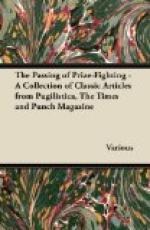* * * * *
Notebooks of a Spinster Lady (CASSELL) is smallish talk about biggish wigs of the Victorian era, but not on that sole account to be condemned. Perhaps rather wholesome as showing how little distant we are from an age of government of the people by superior people for superior people. The notebooks cover the years 1878-1903, but the anecdotes have a much wider range, are often indeed of a venerable antiquity. The lady of the notebooks was not, I fancy, of a critical temper, and versions not too credible of well-known contes figure in her quiet kindly pages. There are moreover stories which I should not hesitate to describe as of an appalling banality if they were not concerned with such very nice people. On the whole I don’t think it quite fair to the spinster lady to have published her notes. They may well have been painstaking jottings to provide material for polite conversation and have sounded much better than they read in cold print. For myself the real heroine of the book is Maria, the poet’s wife, who, on being waked and adjured by her spouse to get up and strike a light for that he had just thought of a good word, replied in un-Victorian mood, “Get up yourself! I have just thought of a bad one.”
* * * * *
Love—on Leave (PEARSON) is the sufficiently expressive title that Miss JESSIE POPE has chosen for a small book of little courtship tales. You never saw a volume of its size, more packed with love, which is shown leaping walls, laughing at locksmiths and generally making the world go round in its proverbial fashion. The pace of the revolutions may be found a little disconcerting. You will perhaps be inclined to amend the title and call the collection “Love on Short Leave,” to mark the regularity with which the respective heroes and heroines fall into each others’ arms at the end of every dozen pages or so. As a matter of fact, the incident that is to my mind the best of the bunch is an exception to this rule of osculation—a happily imagined little comedy of a young wife who thought to avoid the visit of a tiresome sister-in-law by betaking herself for the night to the branches of a spreading beech. Whether in actual life this is a probable course of conduct need not exercise your mind; at least not enough to prevent your enjoyment of her arboreal adventure, which comes, as I say, with the more freshness as a break in what might else be a surfeit of proposals. In effect, a gallant little florin’s worth of fiancailles; though, if you wish to avoid feeling like a matrimonial agency, you will be well-advised to take it by instalments rather than in bulk.




